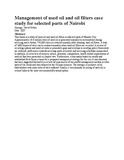| dc.description.abstract | This thesis is a study of used oil and used oil filters in selected parts of Nairobi City. Approximately 26.6 million litres of used oil is generated annually by automobiles during servicing and a further 750,000 litres is extracted annually after draining used oil filters. A total of 2600 tonnes of steel can be realised annually when used oil filters are recycled.
A review of recycling options and used oil sinks is presented, gaps and overlaps in existing policy framework are outlined, preferences towards servicing spots reviewed, and servicing schedules enumerated.
In addition, an overview of sources, nature, potential, composition, health related implications of used oil has been presented in chapter two. Furthermore, a discussion based on results and established facts forms a basis for a proposed management strategy for the city.
A way forward has been suggested backed by a review of experiences of successful management models in other parts of the world and then tailored to the Kenyan scenario. The strategy is inclusive of all stakeholders with main roles of each outlined. Finally, it recommends recycling of used oil in cement kilns as the most environmentally sound option. | en_US |

